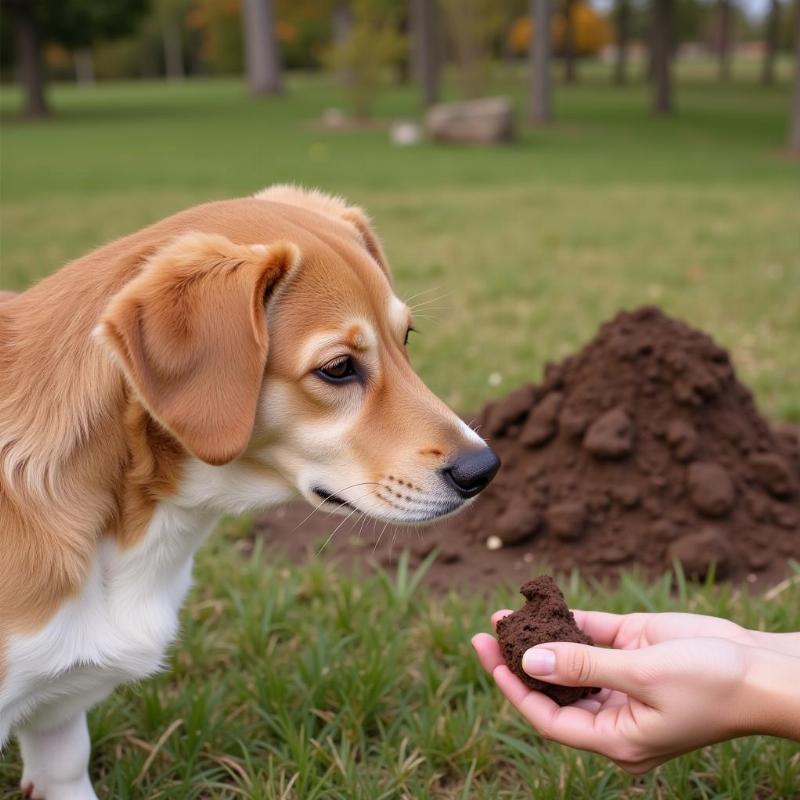Coprophagia, or poop-eating, is a common yet unpleasant canine behavior. If your dog enjoys this unsavory snack, a muzzle can be a necessary tool to protect their health and prevent the spread of parasites. Finding the best muzzle for dogs that eat poop requires careful consideration of comfort, safety, and effectiveness. This article will guide you through choosing the right muzzle to curb your dog’s poop-eating habit, discuss the underlying causes, and explore training solutions to help address this behavior.
While a muzzle can offer a temporary solution, it’s crucial to understand why your dog is engaging in this behavior. Possible reasons range from medical conditions like malabsorption or pancreatic insufficiency to behavioral issues such as anxiety, boredom, or attention-seeking. We’ll delve into these potential causes and provide practical solutions to help your furry friend kick this habit for good. We’ll also explore alternative solutions and the importance of consulting with a veterinarian to rule out any underlying medical concerns.
Choosing the Right Muzzle: Basket vs. Soft Muzzles
When selecting a muzzle for coprophagia, basket muzzles are typically the best choice. They allow your dog to pant, drink, and even take small treats, ensuring their comfort and preventing overheating. Soft muzzles, while comfortable for short periods, restrict panting and drinking, making them unsuitable for extended wear, especially in warmer climates. Proper fit is paramount for both comfort and effectiveness. A well-fitted muzzle should be snug but not tight, allowing for some movement of the jaws.
Understanding Why Dogs Eat Poop
As mentioned, various reasons can contribute to coprophagia. Medical conditions, dietary deficiencies, and behavioral factors can all play a role. Consulting with a veterinarian is essential to rule out any underlying medical issues. They can conduct necessary tests and recommend dietary adjustments if needed.
Medical Reasons for Coprophagia
Certain medical conditions can cause increased appetite or malabsorption, leading dogs to seek nutrients in feces. Conditions like exocrine pancreatic insufficiency, intestinal parasites, and inflammatory bowel disease can all contribute to this behavior.
Behavioral Reasons for Coprophagia
Beyond medical reasons, behavioral factors can also contribute to coprophagia. Anxiety, stress, boredom, and attention-seeking behaviors can all manifest as poop-eating. Proper training, enrichment activities, and addressing underlying anxiety can help curb this habit.
Training and Management Strategies
While a muzzle provides a temporary solution, training is crucial for long-term behavior modification. Positive reinforcement methods, such as rewarding your dog for ignoring feces and offering alternative chew toys, can be highly effective.
Positive Reinforcement Training
Reward your dog with treats and praise when they choose to ignore feces. This positive reinforcement helps them associate good behavior with positive outcomes. Consistency is key to successful training.
Environmental Management
Keeping your yard clean and picking up feces immediately can minimize opportunities for your dog to engage in this behavior. For dogs that eat cat feces, ensure the litter box is inaccessible.
 Huấn luyện chó không ăn phân
Huấn luyện chó không ăn phân
Conclusion
Finding the best muzzle for dogs that eat poop is often the first step in addressing this unpleasant behavior. Basket muzzles offer the best balance of safety and comfort, allowing your dog to pant and drink while preventing them from ingesting feces. Remember, a muzzle is a temporary solution. Addressing the underlying cause, whether medical or behavioral, through veterinary consultation and training is essential for long-term success. By combining appropriate management tools with training and addressing the root cause, you can help your furry friend break this habit and enjoy a healthier, happier life.
FAQ
- Can a muzzle prevent my dog from eating poop completely? Yes, a properly fitted basket muzzle will prevent your dog from eating poop while still allowing them to pant and drink.
- Are soft muzzles suitable for preventing coprophagia? No, soft muzzles restrict panting and drinking, making them unsuitable for extended wear and potentially dangerous, especially in warm weather.
- What should I do if my dog continues to eat poop even with training? Consult with a veterinarian or a certified dog trainer for further guidance and to explore potential underlying medical or behavioral issues.
- What are some alternative solutions to using a muzzle? Environmental management, such as keeping your yard clean, and positive reinforcement training are effective alternatives.
- Is coprophagia always a sign of a medical problem? Not necessarily. While medical conditions can contribute to this behavior, behavioral factors are often the primary cause.
- How do I choose the right size muzzle for my dog? Measure your dog’s snout circumference and length according to the manufacturer’s instructions to ensure a proper fit.
- Can coprophagia be harmful to my dog? Yes, ingesting feces can expose your dog to parasites and harmful bacteria.
Beautdogs.us is your premier online resource for comprehensive dog care information, breed-specific guidance, and expert advice on all aspects of dog ownership in the United States. Whether you’re a seasoned dog owner or just starting your journey with a furry companion, Beautdogs.us offers valuable insights, tips, and resources to help you provide the best possible care for your beloved canine. For expert advice or personalized recommendations, reach out to our team at [email protected] or call us at +1 501-555-7529.